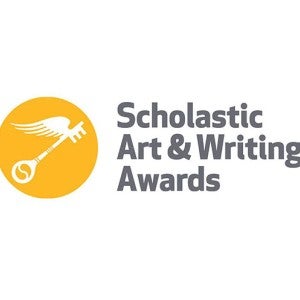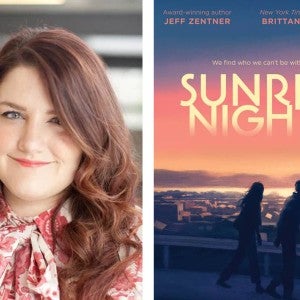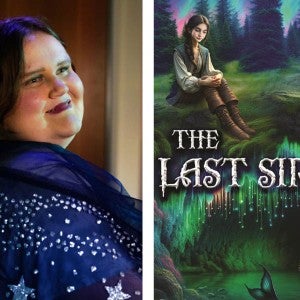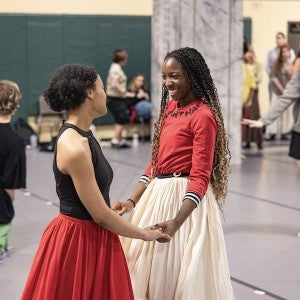Exploring the ins and outs of slam poetry with Regie Gibson
Interlochen Arts Camp Institute faculty member Regie Gibson shares his poetic advice.
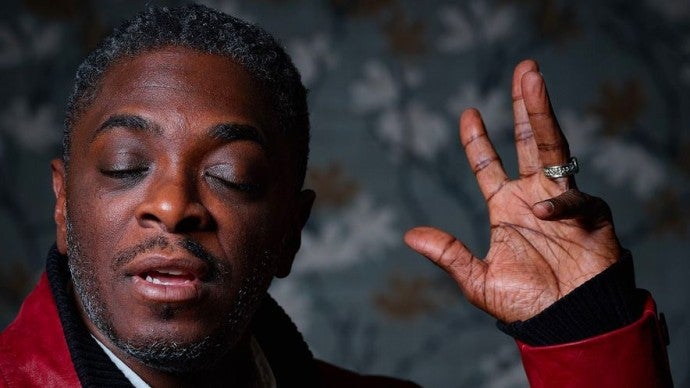
Photo credit: Joe Wallace
Literary performer and former National Poetry Slam Champion Regie Gibson was gifted his first dictionary at the tender age of seven by his loving uncle. His great-grandfather, albeit not a poet, possessed a sense of the poetic that stuck with Gibson throughout his youth. As Gibson once told the Boston Globe, “Every preacher, pimp, politician, and street hustler knew how to ‘spit their literature,’” in his west Chicago childhood neighborhood. That is to say from a young age Gibson was no stranger to rhythm and word.
Since then, Gibson has gone on to make a living with the written word. He’s been featured on HBO's Def Poetry Jam, NPR, and, as a representative of the U.S., competed for and received the Absolute Poetry Award in Monfalcone, Italy. He and his work also appear in “love jones” a feature-length film based on the events of his life.
This summer, Gibson has his well-worn original dictionary will return to Interlochen to oversee the one-week Performance Writing & Spoken Word Intensive. Below, Gibson offers his advice for aspiring or practicing slam poets of any age.
What must a poet always carry with them? Both literally and figuratively.
A dictionary, a book you are engaged with which may be just beyond your immediate ability to comprehend, a book you are rereading, and a writing prompt you can do anywhere. Today, most students have computers and iPads, so they don’t write in books. They don’t write marginalia. It’s a small needling issue that I have about modern technology, but I’m mostly down with it. For instance, when I was a kid I would be reading and need to look up a word in my dictionary. I’d get lost reading other words and forget what I was looking for in a forest of words in the first place. So I’d have to go back to what I was reading in the first place to remember the word that I was originally looking for!
Who inspires you?
Anyone at anytime can be a conduit for connection. But, in general, I don’t trust inspiration to do anything. Perspiration will kick inspiration in the rear almost every time. However, I have noticed that the Muse does tend to show up more often when she sees I’ve already started without her. She’s jealous like that.
What should young poets look for in a mentor?
Someone who gets them but is not too taken with them. Someone who is a little abrasive, but not insulting or belittling. Also, you should be able to speak to them about more than poetry!
Are there common missteps or mistakes that you see from young poets. If so, what are they?
Believing too much in inspiration. Not reading enough history. The desire to earn easy praise. Not recognizing the power of their mistakes. The desire to avoid rewriting and editing. Being too easily distracted and misusing their time and energy—for every minute you spend on Fort-whatever, you are missing out on the chance to grow. Hanging on to friends that actively hinder your growth. Also, don’t assume because you can read that’s all you need. Even if you wrote it, most especially if you wrote it, you have to practice the text by yourself. If you’re reading someone else's work, people have a facility with it, but poets don’t pay attention as closely when it’s theirs. Lastly, what’s your thesis? What do you want people to walk away with once you close your mouth? You want to direct them and not hijack them. What you say should be easily understood and transferable so I challenge my students to consider how do we we communicate our intent plainly.
How do you correct them?
I try and help them realize a few things. First, recognize what is the enemy of your creative life. Distraction, disinterest and disengagement are your enemies. Second, understand that the best part of writing is editing and re-writing! That re-writing and editing are how you find out what kind of writer you are. Initial inspiration may only be a sign of how open and easily affected you are at a particular moment. And lastly, accept that your parents telling you how good you are is not enough. They love you! The world doesn’t have to love you and often won’t unless you contribute to it.
How should young poets build their holistic stage presence?
Depends on who they are. Everyone communicates differently to different crowds of people at different times. However, we all know what generally works in performance to make people pay attention: Eye contact, volume, posture, gesture, tone, articulation, and so on. Practice getting a facility with those—and I mean every day! With that said, people don’t come to heckle at slam poetry events. It’s the friendly audience that you’re going to get. They show up to listen. People are very ready to hear you. Regardless, it’s natural to get nervous. With my students there’s a few tactics that I use to help quell their nerves. I tell them, “You have respect for your audience and that is a good thing, and having nerves is a sign of that.” So just say that you have nerves. If you say that it will make everyone in the audience instantly more accepting of you.
Before you begin check-in with yourself. Do some introspection. If you’re nervous there might be physical, emotional, or psychological reasons. Ask yourself, “How am I feeling? What am I thinking? Do I know my work well enough?” Then just breathe. Everything starts with breathing. Locating the points of tension within you, where you carry your physical tension, and work through it.
What impact does aesthetic have on performance?
If by aesthetic impact on performance you mean beauty, well that typically is a function of proportion, I think. Gregory Orr cites four components that make up a great poem: Music, Imagination, Story, and Structure. Perhaps these are elements attendant to what we believe is beautiful in poetry as well. Or, perhaps I mean elegance.
I look at what’s on the page as a score. Like classical music, it’s about adding or interpreting personality into the piece. I tell students to take the text and sing it. Check your loud and soft range of your voice. You have to figure out how to carry the melody and hidden musicality of your text.
Spaces are still available in Interlochen Arts Camp’s Performance Writing & Spoken Word Intensive. Apply today!

